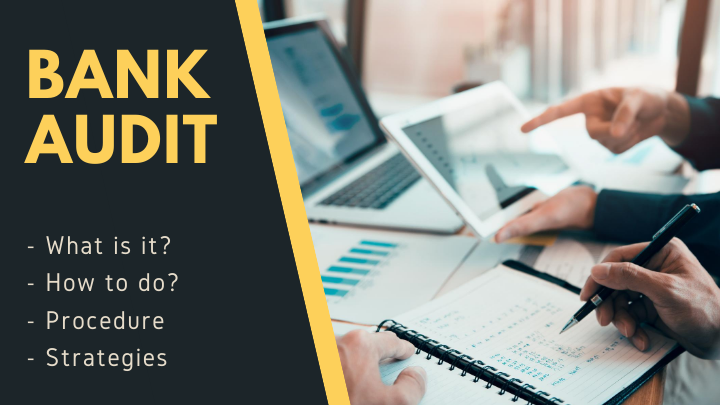
There are a few processes that a financial service business must go through in order to abide by the rules and regulations of the law and industry standards. Banks, credit unions, and other financial institutions must be in compliance with these regulations and operate effectively. One procedure in particular to check for compliance is called a bank audit.
You may have heard the word “audit” before in relation to your personal or business taxes. You could also receive an energy audit for your home to see how you could lower your energy bill. In general, the word audit describes an inspection or examination of records, facilities or financial accounts to ensure that they are operating appropriately, safely, and efficiently.
Learn all about bank audit: meaning, procedure, strategies, how to do it and more.
What is a bank audit?
What exactly does a bank audit entail? A bank audit is a routine examination of the records and services of a bank or other financial institution to assess whether they are in compliance with the laws and standards of the industry.
Bank audit procedures can either be internal or external. It is conducted by an accounting specialist, or bank auditor. Besides this, visiting this site would be ideal if you are searching for the best accounting services in singapore. A bank auditor runs specific tests to generate their findings. The main reasons for a bank audit include the following:
- Find out if the institution’s practices are legitimate, legal, accurate, and complete
- Obtain an independent assessment of the institution’s activities, controls, reports, and systems
- Identify any risks (see more about this below)
- Suggest corrective actions to address any risks
- Ensure that they are in compliance with the law
Furthermore, a bank auditor takes a deeper look into a financial institution’s transactions, including bank wires. By examining financial and regulatory reports, they ensure that the bank account’s monetary flow is accurately recorded to show timeliness and completion. Businesses that work with a financial institution may receive official requests to provide additional documents to assist in the process.
Bank auditing strategies also include making sure that the financial institution is operating effectively. They run tests that pinpoint any incorrect or unauthorized reporting practices. One test in particular is control testing.
One of the most important aspects of a bank audit is revealing any violation of the law. It’s also crucial that the bank auditor uncovers any issues with not following the bank’s own policies. Financial institutions should understand the importance of a bank audit.
A financial institution may also undergo evaluation of their risk-management processes, or a risk-based bank audit. The risks in question include:
- Price
- Liquidity
- Operational risk
- Compliance risk
- Strategic risk
- Reputation risk
- Credit risk
- IT and cyber risk
How to handle a Bank Audit?

Although a bank audit can seem like a stressful situation and can be concerning for bank managers, it is a routine procedure. The following is a list of tips to help you respond properly to a bank audit:
1. Review the request:
First and foremost, take your time reviewing and understanding the official request. Make sure to take note of any time restrictions or other pertinent requirements. If you are unsure of anything, ask for clarification from your point of contact.
2. Discuss the audit with your key team players:
Make sure everyone who needs to know understands what is happening. This can include financial executives and accounting managers who are directly related to the source of the requested information. Focus on what needs to be done and brainstorm any difficulties you might encounter.
3. Hire an experienced attorney if necessary:
It’s highly recommended to bring in a trusted attorney to assist you in the process and ensure complete legal compliance.
4. set up a centralized location for all documentation:
This should be a network storage space and secure physical location, and only specific personnel can access it.
5. Collect and organize the necessary data:
You can enlist the help of a technology expert to gather all relevant data from off-site locations or backup drives in a secure manner.
6. Cross-check all information:
It’s incredibly important to cross-check all of the information with other financial reports in your system. The more validation methods used, the better to ensure accuracy.
7. Combine data into an information package:
Once you’ve gathered all of the necessary information and documentation to back it up, put it all together into an information package. Make sure to include a letter that sums up all of your findings and the legal actions that you plan to take to address any risks or discrepancies.
8. Submit your audit information:
The way you present your information package depends on the type of audit requested. A process audit requires an on-site examination.
9. make sure you receive proof of your compliance with the audit for your records:
After you’ve submitted your information for review, you should request an audit-compliance letter from your audit representative proving your observance of the audit, as well as outlining any changes that occurred from the audit discoveries.
Conclusion
Just to recap, a bank audit involves routine testing and procedures to check for legitimacy and accuracy within a financial institution’s controls, activities, records, and policies. It also entails identifying any risks within the business and offers recommendations in order to address those risks.
Most importantly, a bank auditor’s job is to reveal any activities going on that are in violation of the law. Once a bank auditor has conducted a full review of a business, they can suggest ways to fix any issues that they’ve discovered, or they can see to shutting down a business that is operating wrongfully.
Banks, credit unions, and financial institutions must be regularly evaluated to ensure that they are following all of the required regulations and operating in an effective and accurate way. It is necessary to ensure that a financial institution’s activities are in compliance with the law, industry standards, and their own internal policies.
There are several software solutions to help make the bank audit procedure easier and smoother for all parties involved. There are also companies to help you develop your bank audit framework to best handle the process.
